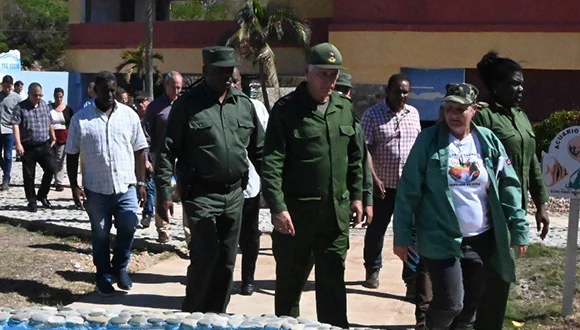Díaz-Canel Checks Recovery in Santiago and Granma provinces

HAVANA, Cuba, Nov 21 (ACN) Cuban President Miguel Díaz-Canel toured locations in Santiago de Cuba and Granma this Thursday to evaluate recovery work after the damages caused by Hurricane Melissa, sources from the Presidency reported.
In Baconao, Santiago de Cuba, Díaz-Canel visited the low-water crossing that connects with the communities of María del Pilar and 13 de Agosto, which was affected by the flooding of the Baconao River. He instructed the authorities of Construction and Water Resources to seek a definitive solution, including a review of the Baconao dam project.
Luis Arias, a community leader, recalled that over 310 millimeters of rain accumulated in the region in three days, which caused the obstruction of 18 of the crossing’s 24 culverts.
He also indicated that river floods recurrently threaten population settlements downstream.
Beatriz Johnson Urrutia, president of the Provincial Defense Council, reported that in Santiago de Cuba, damages have been reported in 110,764 homes, with 3,324 total collapses and 2,950 partial collapses.
Electrical service has been restored to 66.7 percent and water supply to 66.6 percent.
In agriculture, damages are reported in 40,353 hectares of crops, of which 7,473 have been rehabilitated, primarily bananas.
Sanitation is at 89 percent and the epidemiological situation is described as complex.
In Granma, Díaz-Canel spoke with residents of Yara and Las Caobas, where the hurricane caused losses in housing, goods, and rice crops, with reports of 723 hectares affected and the loss of 240 head of cattle.
Yudelkis Ortiz Barceló, first secretary of the Provincial Committee of the Party, reported that electrical service in Granma has been restored to 96.43 percent and telecommunications to 99 percent, while water supply remains the main difficulty.
Carlos Luis Jorge Méndez, First Deputy Minister of Foreign Trade and Foreign Investment, explained that international aid for the main necessities continues to arrive, and resources are being mobilized to activate the country’s industrial capacities.
Betsy Díaz Velázquez, Minister of Domestic Trade, detailed that the distribution of the regulated family basket includes rice, grains, oil, sugar, chicken, and modules of food and hygiene products for affected families, thanks to donations and national reserves.
Carilda Peña García, Deputy Minister of Public Health, reported on the behavior of arboviruses, especially dengue and chikungunya, in the affected areas.
Díaz-Canel highlighted the discipline and unity of the population during the evacuation, which prevented the loss of human lives, and called for maintaining that spirit in the recovery process, although he explained that some solutions will demand time.





